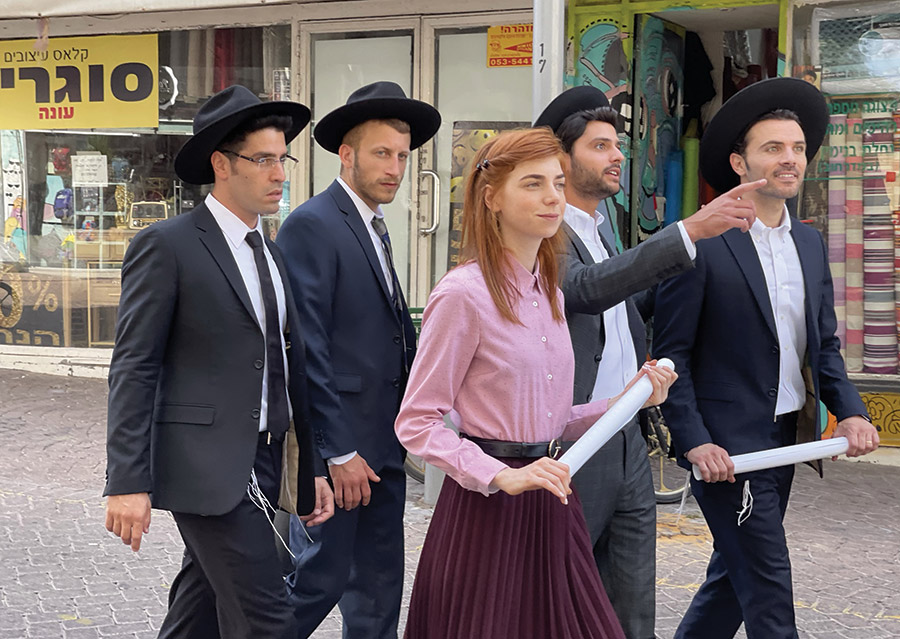Welcome to Rehavia
On a bright spring day in a swanky Tel Aviv neighborhood, a handsome man sporting a trim beard and a perfectly perched black yarmulke alights from an expensive SUV. He kisses his beautiful and modestly clad wife, as three smartly dressed yeshiva boys across the street watch, swoon, and dream of similar lives for themselves. “A yeshiva boy who married well?” one suggests. “No, no—he earned it for himself!” his friend explains: After being expelled from a prestigious yeshiva for owning a smartphone, he flew to Rome, camped out for a week on the doorstep of Borsalino headquarters, and earned the right to open the first official Israeli chain of stores for the high-end Italian hatmaker. Although he is too busy earning money to study in yeshiva full time, he still dedicates time every day to study Talmud. “The modern haredi,” the boys say, sighing. “He enjoys both worlds. He has this and yet he also has that!” As they wave to him crossing the street, a large truck comes out of nowhere and plows into him. And so the show’s question remains: Is it really possible to have both this and that?
Shababnikim, the Israeli sitcom that follows the exploits of four ne’er-do-well
yeshiva students as they try to find their way in contemporary Israel, is back.
Over the past decade, the phenomenon of the “new haredi” has attracted a good
deal of interest here.
Israeli television regularly broadcasts in-depth features exploring the lives
of these religious insiders/outsiders who are part of the ultra-Orthodox
community but do not sequester themselves from Israeli public life. These
documentaries feature men wearing white shirts and pe’ot getting
together to drink beer at a pub, Meah Shearim kollel wives who are
successful social entrepreneurs, and so on. One interviewee explains that the
modern haredi (the descriptor comes from a verb that denotes fear and
trembling) is “no longer afraid. He’s not afraid of what secular people will
say about him; he’s not scared of what the more religious will say about him.
Nobody cares.”

Haredim have good reasons to be confident. They are the Jewish world’s fastest-growing demographic and, according to some estimates, they are poised to become one-quarter of Israel’s population by the middle of the twenty-first century. The future of Israel’s economic and cultural vitality depends on the integration of this community into the workforce and the broader society, and the new haredim are on the vanguard of this process. They also make for great television, as Israeli audiences discovered with the first season of Shababnikim four years ago. (The first season, which is now available in the United States on ChaiFlicks.com under the English title “The New Black,” was reviewed in the Jewish Review of Books by Shai Secunda in 2018.)
When Shababnikim was introduced to Israeli audiences in 2017 by religious filmmaker and showrunner Eliran Malka and Daniel Paran (who passed away the following year), its edgy and fast-paced combination of style, romance, and sophisticated religious content was a first. The show detailed the experiences of four shababnikim (Hebrew Arabic slang for “wayward yeshiva youth”) as they vacillated between the social expectations of their ultra-Orthodox community and the larger Israeli society, not to speak of their own ambitions and desires, and some genuine philosophical and religious questions about how to best live a Jewish life. One student, Avinoam (Daniel Gad), the son of a prominent Sephardi haredi member of Knesset, is hopelessly enchanted by Israeli secular society, even when he is met with indifference, or even derision. Another friend, Meir (Israel Atias), is the product of a working-class North African background and struggles with his low place in the highly stratified yeshiva hierarchy, despite his good looks and attractiveness to an Ashkenaziheiress. Dov Laser (Omer Perelman Striks) is the pampered, disaffected son of an American businessman whose talmudic proficiency is of no help in finding meaning or purpose in his life. Gedaliah, played to perfection by comedian-singer Ori Laizerouvich, stands out from his peers for his brilliance and near fanatical devotion to Torah study, but he struggles to reconcile his natural desires with the austere life of a talmid hakham.
In season one, the great central struggle of the shababniks was with their fanatically strict rosh yeshiva. The show ultimately came down in favor of a laissez-faire but character-strengthening ethos, which took as its unlikely theme song the 1980s rock anthem “Welcome to the Jungle.”
In season two, important changes take hold. Avinoam, Meir, and Dov Laser continue to sip lattes, slink around in bathrobes, and generally enjoy the good life. Gedaliah is still very much a “tzul,” Hebrew slang for a suffering saint, and all four end up at odds with their yeshivot. At risk of losing their social capital and marriageability, they decide to establish a yeshiva of their own, with Gedaliah at the helm. Although this is a very rock and roll move, it means that the same shababniks who once rebelled against yeshiva authority are now faced with adult responsibilities: the challenges of recruitment, HVAC systems, and the thorny religious and personal issues that inevitably arise in running an educational institution.
With whimsical chutzpah, they call their new yeshiva “Chevron HaChadasha,” (The New Hebron Yeshiva), though the old one, perhaps the most important and influential Lithuanian-style yeshiva in Israel, hasn’t gone anywhere (it’s been located in a haredi neighborhood of Jerusalem ever since the Hebron Massacre of 1929). This is a little like a group of college dropouts starting a “New Harvard University” in an apartment in Brookline, Massachusetts (albeit a nice one). Nevertheless, the shababniks have their talents, and the yeshiva grows to be something of a success. Gedaliah is a compelling rosh yeshiva, though slightly unhinged. The shababniks’ people skills and talmudic know-how serve them well as yeshiva administrators—it seems that the “yeshiva business” can be a platform for worldly success.
Yet just as the shababniks finally seem to be growing into their (designer) haredi garments, their presence in Rehavia, “the last secular neighborhood in Jerusalem,” threatens to complicate things. A secular yeshiva moves in right next door. Secular yeshivot, where young Israelis can engage with Jewish texts and strengthen their Jewish identity in a religiously open environment, are in fact a growing phenomenon in modern Israel. This one is a spiritual commune whose members write poetry, smoke marijuana, and observe their religious neighbors with a mixture of curiosity and apprehension. While Malka is bound to attract some opprobrium for his cynical portrayal of haredim, he is also ready to show that life without tradition has its own pitfalls. The cheerful neohippies of the secular yeshiva are certainly less neurotic than Gedaliah, Dov Laser, and company, but they, too, lack a framework for finding love and meaning.
There are blissful moments of coexistence between the two groups, as when the shababniks’ postmodernist neighbors shuffle into the yeshiva to help them make a minyan and seem to really enjoy themselves in the process. There are also points of inevitable tension. For instance, a sheepish Avinoam is forced to ask his neighbors to move their yoga class from right outside the yeshiva windows. His secular counterpart is outraged, repeating bromides about the sanctity of the body. While Avinoam has a tendency to romanticize nonreligious Israelis, even he seems disappointed by how quickly his neighbors can be appeased. The leader of the secular yeshiva agrees to compromise his group’s sacred right to publicly celebrate their bodies in exchange for Avinoam’s new MacBook.
Unlike the exquisitely realistic hit show Shtisel, Shababnikim does not seek to precisely render its slice of haredi life. Rather, it intersperses nuanced character development with stylized and pop-infused sequences to give us a taste of the unique flavor of new haredi culture. For example, the hotheaded matchmaker Shlomi Zacks, with his slick luxurious office, omnipresent Bluetooth headphones, and deferential clipboard-wielding assistant, may owe more to the celebrity agent Ari Gold from HBO’s Entourage than to actual haredi matchmakers, but depicting him this way dramatizes something important about the contemporary world of matchmaking, namely that it, too, is a marketplace concerned with appearances.
Zacks’s proteges bring him to the secular yeshiva to speak about haredi dating norms. The lecture, though completely contrived, is a masterpiece. Zacks explains the delicate dance of the hotel lobby date—she arrives in dark clothing with gathered hair; he wears a suit, hat, and any tie (as long as it’s not red!). Conversations must be entirely prosaic—no awkward revelations or discussions of feelings. And most importantly, one must order only water:
And from the moment this first date ends, the main thing this bochur will do is daydream about this young woman sipping water. I guarantee to you, there is no greater longing than the longing of a yeshiva bochur for a young woman who drank water for the first time across from him.
This is parody, but it also gets at an important truth. Rigid social norms can intensify desire by channeling it in a specific direction.
Shababnikim generally succeeds in transcending the stereotypes that are often the focus of shows about Orthodox Jews, perhaps the most popular of which is Netflix’s recent My Unorthodox Life. That reality TV show portrays one woman’s emancipation from her oppressive religious Jewish upbringing into the glamorous world of fashion and fame as the CEO of a modeling agency. “In our [Orthodox] community, thinking about your external appearance is bad,” the series star, Julia Haart (née Talia Hendler) tells the audience in episode 5 and contrasts it with her new life, which involves designer clothing, European travel, and expensive homes, not to speak of a billionaire husband to foot the bill. Interestingly, the Orthodox world of Shababnikim is not bereft of glamor and riches. One might even compare Haart’s wealthy husband with Dov Laser’s clueless American grandmother, whose magnificent Rehavia apartment provides the playground in which much of the second season is set. Indeed, Malka understands that modern black-hat yeshiva culture is anything but a wasteland of style. A promotional video for the series, which features swaggering young men in closely tailored suits stopping to kiss a mezuza, declares “black is the new black.”
An early episode set in a fictional Tel Aviv Brooks Brothers store features the well-known actor Yehuda Levi, who tells the shababniks that if he ever becomes religious, it will be because of black-hat chic: “Circle the whole Tel Aviv and you will not find a single person who has this level of class. Go to Brooklyn, go to Jerusalem, that’s where you learn about style.” Yet in Shababnikim, glamor is not the narrative purpose of the series.
Although Shababnikim persuasively dramatizes the quandaries of new haredi life, Malka himself leans toward the modern Orthodox and religious Zionist camp, and one senses a dialectical sensibility in his show that recalls the religious Zionist visionary Rav Kook much more than it does haredi religious leaders. For every value expressed in Shababnikim,there is a competing or contradictory sentiment articulated at the same time.
We see this sensibility at work in the portrayal of Gedaliah’s scholarly fiancée Devorah, played by Maya Wertheimer, a well-known model, actress, and social media star and the scion of one of Israel’s wealthiest families. Wertheimer’s performance sparkles with wit, and in season two, Malka gives Devorah more attention. She has become a budding religious feminist—and a thorn in Gedaliah’s side. When she gives Gedaliah a beautiful handwritten scroll of Megillat Esther as a prewedding gift, Gedaliah is overcome with love and appreciation. When she insists on using it herself to lead an all-women’s Megillah reading, he’s ready to break off the marriage altogether.
Malka neglects to share the important fact that women like Devorah don’t really exist in the haredi world; they are almost exclusively found in religious Zionist communities. Yet her presence reminds the viewer that the tensions raised by Shababnikim are not exclusive to the ultra-Orthodox. The challenges faced by the new haredim resemble challenges faced by other Orthodox communities, both within Israel and in the diaspora. Yet, with apologies to the classic Israeli TV series Srugim, one senses that the show would not be as fast or fun with knit kippa-clad protagonists quoting the existential teachings of Rabbi Joseph B. Soloveitchik. Moreover, there is a way in which the new haredim experience the acute contradictions of modernity in a way that is undeniably more intense than their more modern Orthodox brethren.
For instance, when two scheming students endeavor to make “New Hebron Yeshiva” more unapologetically haredi, Avinoam is forced to confront their criticism and ask himself why he is so obsessed with secular approval. Later, when Gedaliah tries to dump Devorah for a more conventional haredi woman who will not drive him crazy, Devorah reminds him of the close friendship of the talmudic adversaries Rabbi Yochanan and Reish Lakish. “All of Torah is one great disagreement,” she says.
Comments
You must log in to comment Log In
Suggested Reading
Shababshubap
Black hat chic: Shai Secunda's review of Shababnikim, the new television show about cool yeshiva students.

Shas: The Movie
If you think this Israeli election is raucous, travel back to 1984 and Shas's arrival on the political scene in the film The Unorthodox.

Fauda: The Wages of Chaos
Fauda, which takes its name from the Arabic word for chaos, opens in an adrenaline rush of noise, confusion, and jagged camerawork.
Marginalia
Israeli director Joseph Cedar's new film Footnote was anything but that at the Cannes Film Festival, despite its setting in the Hebrew University Talmud department.
Evan Zuesse
A very interesting article, but the praises regarding Shtisel somewhat discredit it. Shtisel is not "exquisitely realistic." It actually seriously falsifies the Orthodox environment it pretends to depict. Almost every character has something of an anti-Judaic cartoonist quality, if not of antisemitic caricatures per se. For example, the series begins with an account of the 26-year-old son of a widowed rabbi, Akiva, who when he loses his job as a school teacher pursues a career as a painter by painting portraits of saintly rabbis, as an assistant to a celebrated painter in the Haredi community who insists on taking all the credit for the paintings for himself while paying a pittance to Akiva. So here we see the tricksterism and phoney pretentions of the pious Jewish hypocrite. Akiva's father Shmuel Shtisel deplores any painting career for his son on the basis that any depiction of the human image is forbidden -- a closed-mindedness notably absent from the Haredi community where paintings of traditionalist content are found in most homes. Shmuel also forbids another son to take up singing as a career, viewing that too as forbidden by the Torah, frivolous and morally risky. That son is tormented by this, but finally finds a tolerant secular musical band willing to take him in, but the inevitable compromises with his Orthodoxy end up driving him back to the Haredi world and the loss of his dearest hopes. But such supposedly Haredi cruel and repressive strictures contrast with the nearly universal love and respect actually given famous singers and musical groups in the Haredi world, which has produced a huge number of successful fully Orthodox bands providing entertainment at weddings, bar mitzvah celebrations, religious festivals and other occasions. Hasidic music has flourished in Haredi circles since the beginning of Hasidism itself. We are introduced early in the series to Akiva's sister, Giti, whose husband has abandoned her and run off with a Gentile woman; but he refuses of course to grant Giti a proper kosher divorce, making her an Agunah who cannot marry anyone else. There is presumably one such unfortunate in every Haredi family. Poor Giti needs to find a job to support herself and her five children, and luckily is taken in hand by Grandmother Malka, a sweet old lady who lives piously in a local nursing home, but she secretly is a typically unethical Jewish money-changer -- she hides the accounts in her deceased husband's Talmud tomes, and she teaches her assistant Giti how to distort the exchange rates to cheat her clients.
We meet with Shmuel's brother Nukhem. He reveals another Haredi trait, namely hatred of all non-Jews and unobservant Jews as well: he has the endearing trait of cursing them in nearly every sentence he utters.
One of Giti's daughters falls in love with a yeshivah student, he returns her love and marries her simply by declaring to three other students that they are getting married. That this is not a halakhic method of getting married is not even suggested in this "exquisitely realistic" TV series.
One could go on. I personally know quite a few Haredim and visit Jewish nursing homes where quite a few elderly Haredim can be found, but as it happens have never met with dear old Jewish ladies who are money-changers there. It is really not a very common occupation for such ladies, or even for Jews generally since the passing of the Middle Ages, regardless of what antisemites or ignorant secularist Israelis in northern Tel Aviv may think. Nor have I met with gypster portrait painters, prohibitions on artists and singers, nor even any women who are agunahs, although such people seem to be thick on the ground in Shtisel-land.
Richard Middleton-Kaplan
Thanks to Evan Zuesse for the comment. On the subject of portrayals of Orthodox and Haredim, are you aware of any novels that give a positive portrayal of those communities (other than the works of Chaim Potok)? I am part of a Jewish book club that has read several books with severely negative portrayals--most recently, Pearl Abraham's *The Romance Reader: A Novel*--and I would like to propose a novel with a more balanced or even positive portrayal of those communities. Do you have any recommendations?